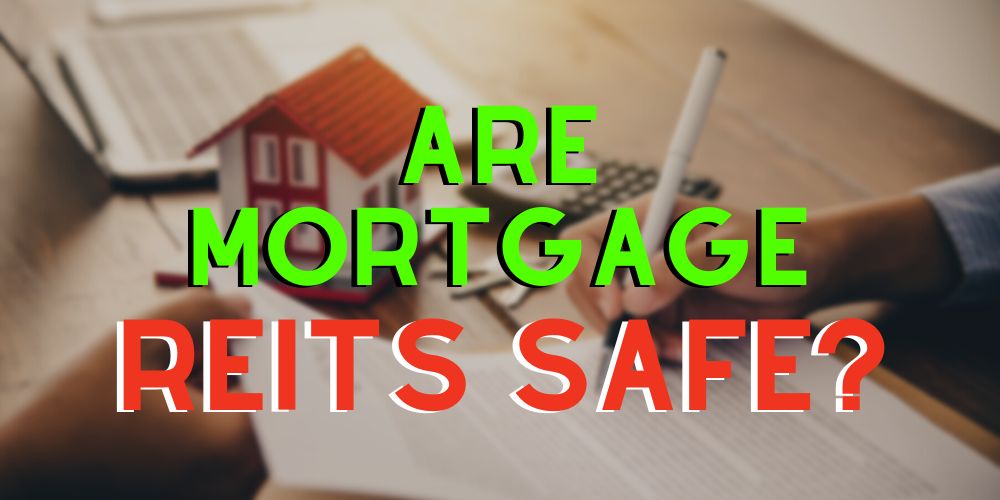Mortgage REITs are high dividend-paying financial instruments, which makes them a lucrative option for those looking for regular income. But are mortgage REITs safe, or are they riskier than stocks and other investment options? Let’s find out.
About Mortgage REITs?
A mortgage real estate investment trust (mREIT) finances real estate deals by creating or purchasing residential and commercial mortgages or mortgage-backed securities.
Unlike equity REITs, which own and operate real estate themselves, mREITs do not directly own properties.
They help buyers purchase property by providing them with credit, which they pay off over time and with interest.

Providing mortgages is a very significant function in the real estate market. These companies have helped finance more than 1 million home buyers in the US.
mREITs also offer commercial mortgages for buyers who are looking to invest in hospitals, retail spaces, and so on.
They make money through the interest that the real estate buyers pay back when they repay the mortgage.
At the same time, they also must pay back the money (with interest) to those from whom they raised it to create the mortgages in the first place.
The difference between these two amounts becomes their net income.
Are REITs Considered High Risk?
Real estate investment trusts are not considered high-risk investments.
Publicly traded REITs often have a diversified portfolio of real estate holdings and pay back 90% of their earnings as dividends to investors every year.
These financial instruments are traded on the stock markets and need to comply with the rules of the Securities and Exchange Commission.
The rules include disclosure of earnings and statements of holdings, which makes it easy to judge their performance and the strength of their underlying assets.
However, they are not completely risk-free.

For example, their performance might be impacted by changes in interest rates. In particular, Mortgage REITs typically perform poorly when interest rates start to rise.
This is because high-interest rates increase their funding costs but reduce the number of new mortgages they can lend out.
Apart from this, sector-focused REITs, such as those working only in hospitality, retail, or health care, might be vulnerable to the ups and downs of their specific industry.
How Do Mortgage REITs Make Money?
mREITs make money on the net interest margin between the rate at which they offer mortgages vs the rate at which they raise funds to finance those mortgages.
These trusts create or purchase mortgages and mortgage-backed securities. This helps finance the purchase of income-producing real estate by investors.
All such mortgages have a payback period and an associated interest rate. Buyers return the mortgage amount along with interest in regular installments.
On the flip side, they raise funds to finance these mortgages from various sources. This money also comes at a certain interest cost.
The difference between the interest they get from real estate buyers and what they pay back to their sources of funds is what constitutes their income.

What Is the Difference Between Equity REITs and Mortgage REITs?
Equity REITs own and operate income-producing real estate, whereas Mortgage REITs finance real estate deals by creating or buying mortgages and mortgage-backed securities.
One major difference between the two is that equity REITs make their money through rental income, whereas mortgage ones earn profits through interest income from mortgages.
Moreover, interest rates impact mREITs more significantly than equity ones. This is because rising rates immediately raise funding costs and also reduce the number of new mortgages.
On the other hand, equity REITs might actually benefit from rising rates because, with higher rates, more people prefer to use rentals rather than buy new real estate.
Lastly, mortgage REITs typically offer better dividend yields than equity REITs.
Are Mortgage REITs Safe?
Out of the three major types of REITs, mREITs are considered the riskiest.
There are some unique risks associated with them, such as interest rate risk, credit risk, rollover risk, and prepayment risk. Let’s look at these in more detail.
Interest Rate Risk
mREITs borrow money to create mortgages or mortgage-backed securities.
Rising rates increase borrowing costs for mREITs, while also reducing net interest income as fewer people take mortgages.
Moreover, it increases the risk of defaults and delinquencies from mortgage takers.

Credit Risk
If borrowers start to default on their mortgage payments, it impacts the earnings of the mREIT.
While residential mortgage loans are agency securities backed by the government, commercial real estate mortgages are not. Hence, this risk is more relevant to commercial mortgage loans.
Prepayment Risk
Mortgage takers can choose to prepay their loans.
This creates a situation where the trust has to reinvest the prepayment amount at the current market rates, which may be different from the original mortgage.
If the prevailing rate in the market is lower, this might reduce earnings.
Rollover Risk
mREITs in the residential sector often give out long-term mortgages, but the funding they obtain to create them might be short-term.
As each short-term credit matures, the trust then has to find a suitable way to roll over the loan so that the net interest margin remains positive.
If it cannot roll over in this way, incomes get impacted.
What Type of REIT Is the Safest?
There are three types of REITs: publicly traded, publicly non-traded, and private. Of these, public ones are considered the safest investment because they are highly liquid and offer better financial disclosures as required by the SEC.
Private ones, on the other hand, are not traded on stock markets, making them very illiquid. They also don’t offer easy exit routes for investors to withdraw their money.
In many cases, you might have to pay a hefty fee or wait until the REIT is liquidated.
Lastly, private REITs are not required to have strict financial disclosures and, therefore, might have a higher risk of fraud and deception about the quality of the underlying assets.
How Are Mortgage REITs Taxed?
Most dividends that mREITs pay out are taxed at the regular income tax rate of the investor. At a maximum, this can be 37%, plus a 3.8% surtax.
Up to 20% of the qualified income from REITs is eligible for deduction as part of the provisions of the Tax Cuts and Jobs Act of 2017.
If all 20% gets deducted from REIT income, the highest effective tax rate becomes 29.6% (80% of 37%), with the 3.8% surtax.

In certain scenarios, this can be even lower.
For example, if the income tax slab of the investor is lower than the maximum tax rate, then they would be liable for the lower tax as per their applicable rate.
In some cases, REITs may declare part of their income in the form of capital gains (though this is usually unlikely). Such income gets taxed at 20% +3.8% surtax.
Lastly, some REITs are allowed to pay corporate taxes or may have a subsidiary that can do so. In such cases, the dividend becomes taxable capital gains tax rate: 20% + 3.8% surtax.
What Happens to Mortgage REITs When Interest Rates Rise?
There are three impacts of rising rates on mortgage REITs: the cost of borrowing increases, the value of mortgage-backed securities falls, and the risk of default from mortgage buyers increases.
Cumulatively, all of this leads to lower incomes for them.
Mortgage REITs borrow money to create or purchase mortgages. With rising rates, these loans become more expensive.
Moreover, the value of mortgage-backed securities falls during rising rates because the maturity period for the underlying mortgage assets goes up.
On the other hand, debtors who have taken variable-interest mortgages might face pressure due to higher rates and may find it difficult to meet their mortgage payments.
This increases default risk and, therefore, further reduces earnings for mREITs.
Are REITs Riskier Than Stocks?
REITs are seen as a form of passive income through dividends paid out regularly, whereas many investors buy securities for their growth potential.
In this sense, REITs are less risky than stocks, since they regularly distribute their earnings to investors.

They also have strict regulations as to where and how much they can invest their earnings.
REITs were designed to only indulge in passive investment, since their purpose was to allow small investors to get a piece of the real estate earnings pie.
Companies that issue stocks have a freer hand in reinvesting their earnings.
While this offers a higher potential for growth, it also increases risks.
Having both in a portfolio is a sound idea because returns from real estate are often decoupled from the stock market.
Thus, REITs can be an excellent hedge against downturns.
Are REITs a Good Investment?
REITs are a good investment for those looking for regular passive income along with some capital appreciation over a long-term horizon.
They have historically offered stronger than index returns in the long term.
Moreover, REITs are also a reliable hedge against market downturns, recessions, and rising inflation rates.

Since real estate has a comparatively low correlation with other asset classes, REIT earnings do not get impacted as much by factors that influence stock markets significantly.
Moreover, when inflation increases, real estate tends to yield better rentals and capital appreciation as well, whereas securities and related asset classes perform poorly.
Thus, REITs do better during inflationary periods,
Having both types of financial instruments in a portfolio helps diversify it and reduces its overall risk profile.
Final Thoughts
Mortgage REITs are a high dividend-paying asset class (compared to equity REITs), with moderate capital appreciation opportunities.
However, their higher returns also come with higher risks in the form of interest rate risk, credit risk, prepayment risk, and rollover risk.
They play a critical role in the real estate market by offering debt to buyers at reasonable rates. But they become risky during periods of rising interest rates.
In general, they are safer than stock market investments because they pay out a large part of their earnings. In addition, they are subject to strict regulations on where they can invest their net incomes.
Lastly, they are an excellent way to hedge your portfolio against risks of slowdowns, high inflation, and recession.


 Tags:
Tags:










